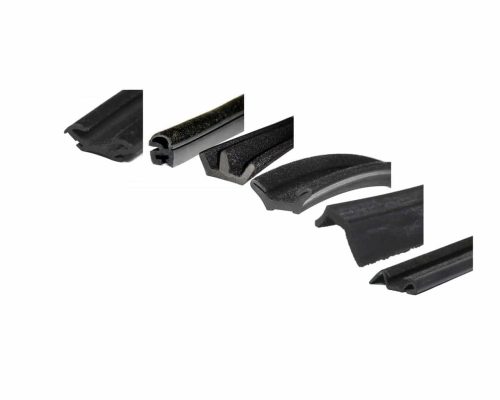Carved seals
Cut gaskets or, in other words, flat sealing rubbers represent another part of our production possibilities.

PRODUCT DESCRIPTION
Description and use
In addition to extrusion, additive manufacturing (3D printing), and molding, the products cut on a digital plotter or water jet represent a group of piece products. The process of gasket manufacture is much simpler (compared to extrusion or molding), especially because of no need to make the mold before sampling itself. Another main advantage is the speed and accuracy of the design of the shape-demanding gasket, washer, filling, etc.
Properties
The properties of individual products are given by the input materials and the area size of the digital plotter. In our case, the dimensions are: 1,600 x 2,500 mm
Performances
The most common products are various shaped gaskets, washers, flanges, intermediate rings.
In this respect, in terms of shape, this technology offers a very wide use.
The shape of the gasket is made based on a sample, sketch, or drawing. Commonly supported formats are:
Autocad: .dxf .dwg
CorelDRAW .cdr
Adobe Reader .pdf
Material basis
- rubber (NBR, SBR, PU, EPDM, VITON, SIL, Para rubber, Neoprene …)
- asbestos-free sealing plates (klingerit)
- graphite plates (with Al, Ni, stainless steel)
- Teflon (pure, filled with MoS2, bronze, carbon, graphite, glass)
- technical plastics (PE1000, POM-C, PA6 …)
- microporous rubber (EPDM, MVQ, VITON)
- felt and others
Technical documentation
Description and use
Polyethylene (PE) gasketsThey are characterized by high resistance to corrosion and stress and very good mechanical and physical properties. They do not contain any additives and are resistant to standard weather conditions and temperatures from -15 °C to + 70 °C without changing the performance properties, however, with prolonged sun exposure, there is a slow aging process. They are made of a granulate with a specific weight of 0.92 g / cm3, and a hardness of approximately 47 °ShD.Metal Reinforced Gasket (MRG)These gaskets are produced by co-extrusion of a steel strip and other material or several materials. This combination enhances the properties of primary materials for a specific purpose in several industries, especially automotive. This type of gasket replaces inconvenient gaskets that are loosely inserted, glued, or otherwise assembled. The properties of the individual gaskets are given by the materials combined in series.Flocked gasketsFlocked gaskets are made as a combination of rubber and flock. The result of this process is a gasket that is used in several industries, mainly automotive or rail. This type of gasket replaces inconvenient gaskets that are loosely inserted, glued, or otherwise assembled. The properties of the individual gaskets are given by the materials combined in series.
Properties
Performances
Material basis
Technical documentation
SAMPLES OF PROFILES
Other profiles (PE, FLOCK)

PRODUCT DESCRIPTION
Description and use
Polyethylene (PE) gasketsThey are characterized by high resistance to corrosion and stress and very good mechanical and physical properties. They do not contain any additives and are resistant to standard weather conditions and temperatures from -15 °C to + 70 °C without changing the performance properties, however, with prolonged sun exposure, there is a slow aging process. They are made of a granulate with a specific weight of 0.92 g / cm3, and a hardness of approximately 47 °ShD.Metal Reinforced Gasket (MRG)These gaskets are produced by co-extrusion of a steel strip and other material or several materials. This combination enhances the properties of primary materials for a specific purpose in several industries, especially automotive. This type of gasket replaces inconvenient gaskets that are loosely inserted, glued, or otherwise assembled. The properties of the individual gaskets are given by the materials combined in series.Flocked gasketsFlocked gaskets are made as a combination of rubber and flock. The result of this process is a gasket that is used in several industries, mainly automotive or rail. This type of gasket replaces inconvenient gaskets that are loosely inserted, glued, or otherwise assembled. The properties of the individual gaskets are given by the materials combined in series.
Properties
Performances
Material basis
Technical documentation
Description and use
Polyethylene (PE) gasketsThey are characterized by high resistance to corrosion and stress and very good mechanical and physical properties. They do not contain any additives and are resistant to standard weather conditions and temperatures from -15 °C to + 70 °C without changing the performance properties, however, with prolonged sun exposure, there is a slow aging process. They are made of a granulate with a specific weight of 0.92 g / cm3, and a hardness of approximately 47 °ShD.Metal Reinforced Gasket (MRG)These gaskets are produced by co-extrusion of a steel strip and other material or several materials. This combination enhances the properties of primary materials for a specific purpose in several industries, especially automotive. This type of gasket replaces inconvenient gaskets that are loosely inserted, glued, or otherwise assembled. The properties of the individual gaskets are given by the materials combined in series.Flocked gasketsFlocked gaskets are made as a combination of rubber and flock. The result of this process is a gasket that is used in several industries, mainly automotive or rail. This type of gasket replaces inconvenient gaskets that are loosely inserted, glued, or otherwise assembled. The properties of the individual gaskets are given by the materials combined in series.





